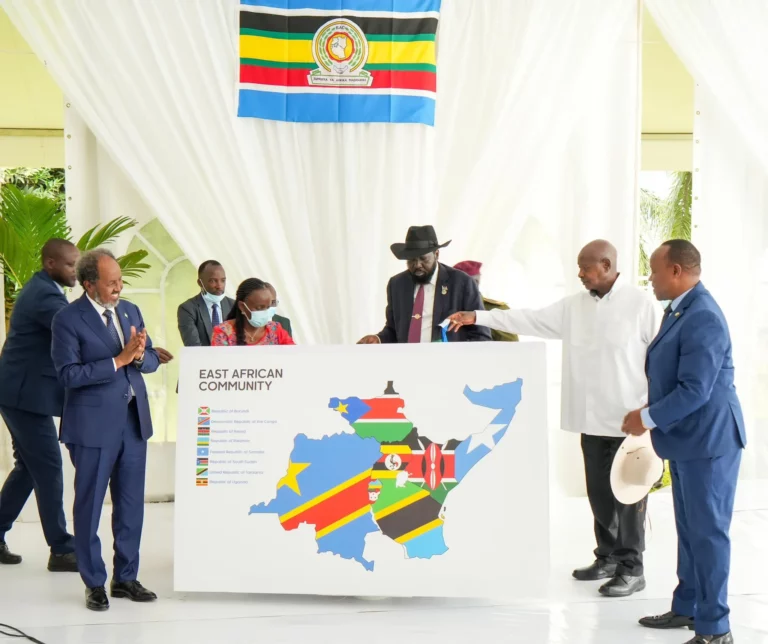For the wider East and Horn of Africa region, the start of the year 2024 is one to forget. It began worse than it ended.
Its diversity has manifested more of a nightmarish curse than a majestic blessing. The recipe of division has been more pronounced than the ingredient of unity. In East Africa, there has been no containing of outbursts of pent-up emotions.
Rwanda-DRC conflict
The binding objective of the East African Community (EAC) proved too weak in the face of acrimonious differences among the partner states. Persistent differences between Rwanda and the Democratic Republic of Congo (DRC) show no signs of abating.
The fallout between the two escalated, with Rwanda’s suspected role in the Eastern DRC constituting a key electoral issue in the DRC’s December 2023 elections.
Matters could not have gone worse for Rwanda, with Burundi accusing it of being behind the rebels that attacked the latter’s border town with the DRC in December, leading to the deaths of 20 people. Earlier this month, Burundi closed its border with Rwanda.
Kenya-Uganda dispute over oil importation deal
Elsewhere, Kenya, long known to be the region’s sober mind, has been mired in troubles of its own. Trouble with Uganda over the oil importation deal that started last year didn’t get any better.
What started last year as a disagreement ended up with Uganda filing a case against Kenya at the East African Court of Justice (EACJ) earlier this month. As the differences with Uganda were festering, another front opened with the DRC.
Kenya’s move to give a carte blanche to DRC rebels to unveil an outfit in Nairobi expectedly triggered tensions with Kinshasa, culminating in the latter’s decision to recall its ambassador.
Most recently, there were outbursts between Kenya and Tanzania over civil aviation. Tanzania banned Kenya’s flights after being denied permission to operate cargo flights into Kenya. This was, however, swiftly addressed.
Beyond East Africa, matters were not getting any cooler. The protracted civil war in Sudan was an unsettling diplomatic balance. Kenya’s decision to provide a red-carpet reception to the head of the Rapid Support Forces (RSF), Mohamed Dagalo, triggered a diplomatic fallout between Nairobi and Khartoum, with the latter recalling its ambassador.
The military faction, which appears to control state instruments, is increasingly becoming hostile to IGAD and the IGAD-led initiative to broker peace between the two factions.
Elsewhere, Ethiopia’s dogged determination to overcome the challenges of being landlocked opened up yet another flashpoint. The decision to strike a deal with Somaliland to access the seaport resulted in open protests by Somalia, which considers the break-away Somaliland part of its territory.
AfCFTA offers Kenya a significant market platform
The totality of the situation is messy and offers no hope for a region that should otherwise strive to leverage its vastness and diversity to advance its progress.
But it should not be hopeless. By recapturing its old spirit, Kenya stands a chance to calm the sweltering situation. Not only would it be the right thing to do, but it would positively serve Kenya’s economic and geostrategic interests.
Kenya’s Northern Corridor, a key regional transport artery, stands to benefit from a calm region. President Ruto has expressed a desire to extend the Standard Gauge Railway (SGR), a key component of the Northern Corridor, to Uganda, the DRC, and Congo Brazzaville.
Disputes with any of the countries naturally threaten Kenya’s quest to leverage its geographic advantage to service the hinterland. Hesitation to pick up fights must constitute Kenya’s inherent strategy, especially given the rising competition posed by Tanzania’s Central Corridor. Developments in the Horn must attract Kenya’s attention too, given the presence of its interests there.
The viability of the Lamu Port, South Sudan, Ethiopia Transport Corridor (LAPSSET) crucially depends on the stability in the Horn.
As the region, indeed, the continent, seeks to open itself up economically, Kenya should strive to position itself to reap the attendant benefits.
Though its full potential may not be realized overnight, the African Free Continental Trade Area (AfCFTA) offers Kenya a good market platform.
Closer home, an expanding EAC, with the recent admission of Somalia, expands Kenya’s key regional export market.
Attendant benefits should, therefore, incentivize Kenya’s quest to cool the rising temperatures within the region. It can leverage the economic, diplomatic, and geostrategic tools at its disposal to secure its interests.




